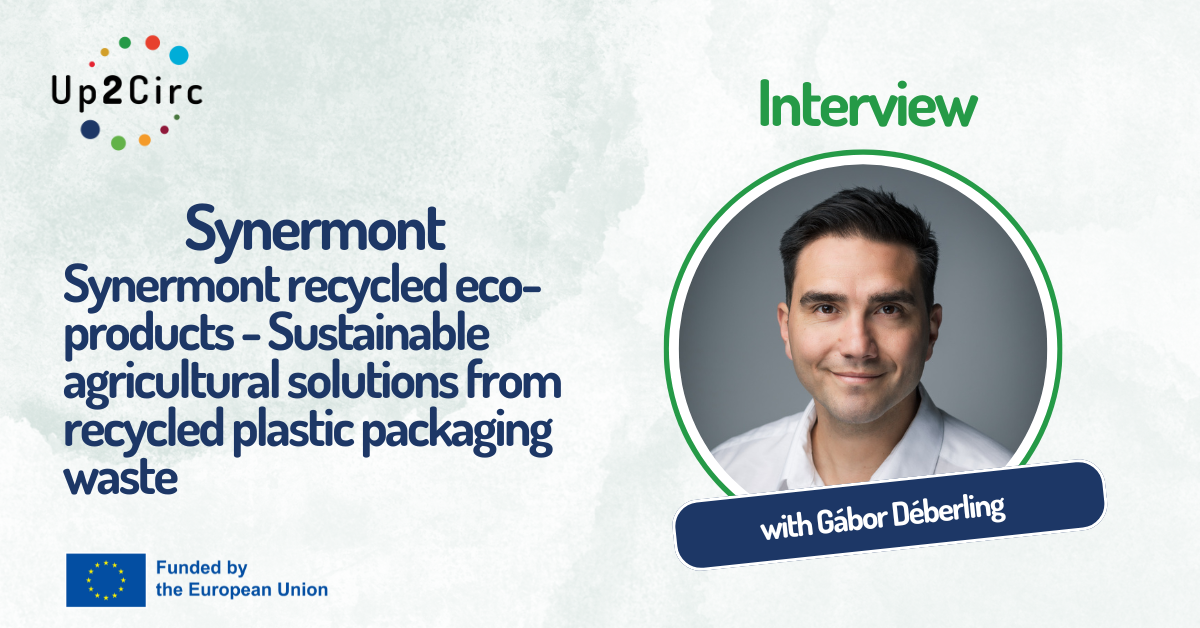
Synermont Zrt.
Gabor Deberling
Manufacturing
Hungary
Synermont recycled eco-products – Sustainable agricultural solutions from recycled plastic packaging waste
CIRCULAR BUSINESS MODEL: Recovery and recycling
Synermont Zrt. is a Hungarian manufacturing company specialized in extrusion and contract manufacturing solutions. Within the Up2Circ project we explored how recycled plastic packaging waste can be transformed into valuable products for the agricultural and gardening sectors. The aim was to design a scalable concept and product portfolio that provides sustainable alternatives to wood, concrete, and metal.
Our core expertise is in extrusion technology and sustainable contract manufacturing. The Up2Circ project started in 2024 as part of our strategic goal to expand into circular economy solutions. The project aligns perfectly with our mission to combine innovation with sustainability and to create new business opportunities from recycled materials.
What motivated you to make your business more circular?
Both external and internal drivers played a role. On one hand, EU regulations and market demand are strongly pushing towards sustainable products. On the other hand, our team has always been committed to responsible manufacturing and reducing waste. This was a natural next step for us.
Implementation process
What were the main objectives of your feasibility study?
We wanted to explore the technical feasibility of producing recycled plastic products, identify the most promising product portfolio, and map out the supply chain and licensing requirements. Another objective was to evaluate environmental impact and define measurable indicators for sustainability.
What activities did you carry out during your project?
We conducted market research across Europe, developed a detailed product portfolio concept (with fence posts and garden edging as key items), and analyzed supplier options in Hungary and abroad. At the same time, we assessed the necessary infrastructure investments for scaling up production.
What feedback did you receive from stakeholders (customers, suppliers etc.)?
Feedback has been very encouraging. Agricultural stakeholders emphasized the importance of durability and low maintenance, while private gardening and landscaping partners highlighted aesthetics and design. This dual feedback has guided us to develop a differentiated product strategy.
Impact & Outcomes
What were the main results and outcomes of the project for your company?
The main outcome is that we now have a validated concept with a clear product portfolio and a roadmap for production. The project helped us better understand both the market demand and the technical requirements, which significantly strengthens our strategic planning.
Did you detect a positive impact of circular transition for your company and for the environment?
Yes. Environmentally, we confirmed that recycled plastic products can reduce waste and replace wood and metal, lowering CO₂ emissions and deforestation. For our company, the project opened new perspectives for diversification and long-term growth
Have you already implemented any changes?
Yes. We have integrated circular thinking into our operations and started preparing the production infrastructure for recycled products. We are currently in active discussions with technology providers and partners for the next implementation phase.
Lessons learned
What key lessons did you learn regarding circular innovation?
One key lesson is that collaboration is essential – with suppliers, distributors, and technology partners. Another is that market segments differ significantly: agricultural buyers focus on robustness, while private buyers value aesthetics. Understanding these differences is crucial.
Did you encounter any challenges?
Licensing and regulatory complexity was a challenge, as well as ensuring consistent raw material quality. These are manageable with the right partnerships and phased implementation.
If you could do your project again, what would you do differently?
We would involve potential customers even earlier in the design phase. Early user feedback is extremely valuable for aligning product features with expectations.
Future plans & recommendations
What are your next steps towards circular transition?
We are working on scaling up production capacity, finalizing partnerships with extrusion technology providers, and preparing pilot production for selected product categories. Our aim is to bring the first recycled plastic products to market in the coming years.
Is there any advice you would give to other SMEs looking to adopt a circular business model?
Start with a clear focus, involve customers early, and don’t underestimate the importance of supply chain design. Circular business is not only about the product – it is also about building the right ecosystem.
How can policymakers or financial institutions better support businesses in adopting circular practices?
Access to grants and supportive funding was critical for us. In addition, simplifying licensing procedures and offering tax incentives for recycled products would greatly accelerate adoption.
Do you have any additional comments or reflections about your participation in the Up2Circ project?
We are very grateful for the opportunity to be part of Up2Circ. The project helped us to think bigger and to position our company in a growing circular economy market. It has been a motivating journey, and we are excited to continue.
